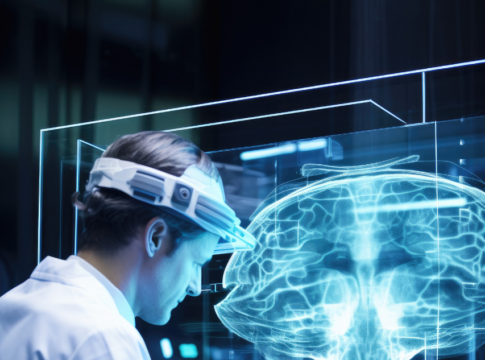Artificial Intelligence (AI) is at the forefront of transforming healthcare, particularly in the realm of diagnostics. The integration of AI into healthcare systems is not only enhancing the speed and accuracy of diagnostics but also paving the way for personalized treatment plans. This technological advancement promises to revolutionize how we detect, diagnose, and manage diseases, ultimately improving patient outcomes and efficiency in healthcare delivery.
Enhancing Diagnostic Accuracy
AI algorithms are designed to analyze vast amounts of medical data with incredible precision. Traditional diagnostic methods often rely on the interpretation of imaging studies, lab results, and clinical symptoms by healthcare professionals, which can be prone to human error. AI systems, particularly those employing machine learning and deep learning techniques, can process and analyze medical images, such as X-rays, MRIs, and CT scans, with a level of accuracy that often surpasses human capabilities.
For instance, AI-powered diagnostic tools have shown remarkable success in detecting early-stage cancers, including breast and lung cancer. These systems can identify subtle patterns in imaging data that might be missed by the human eye, enabling earlier detection and treatment of malignancies. Additionally, AI can assist in diagnosing rare diseases by cross-referencing patient symptoms and medical history with extensive databases, reducing diagnostic delays and improving patient care.
Speeding Up Diagnosis
The speed at which AI can analyze and interpret medical data significantly accelerates the diagnostic process. In emergency situations, where time is critical, AI systems can provide rapid assessments of imaging studies and lab results, allowing healthcare providers to make quicker and more informed decisions. This efficiency is particularly beneficial in high-pressure environments such as emergency rooms and intensive care units, where timely diagnostics can be a matter of life and death.
Moreover, AI can automate routine diagnostic tasks, freeing up healthcare professionals to focus on more complex cases and patient care. This automation reduces the time spent on repetitive tasks, such as data entry and preliminary analysis, thus streamlining the diagnostic workflow and improving overall efficiency in healthcare settings.
Personalized Treatment Plans
One of the most exciting advancements in AI-driven diagnostics is its potential to create personalized treatment plans. By analyzing large datasets from diverse sources, including electronic health records (EHRs), genetic information, and lifestyle factors, AI systems can generate insights that are tailored to individual patients. This personalized approach allows for more precise and effective treatment strategies, enhancing the likelihood of successful outcomes.
For example, AI can help in identifying the most effective treatment options for patients with specific genetic markers or those suffering from complex chronic conditions. By considering a patient’s unique genetic makeup and health history, AI can suggest targeted therapies and medications, reducing the trial-and-error approach often associated with treatment planning.
AI in Predictive Analytics
AI is also playing a crucial role in predictive analytics, helping to anticipate potential health issues before they arise. Predictive models analyze patterns in historical data to forecast future health risks, such as the likelihood of developing chronic conditions like diabetes or heart disease. By identifying individuals at high risk, healthcare providers can implement preventive measures and lifestyle interventions, ultimately reducing the incidence of serious health issues.
Challenges and Considerations
Despite its numerous benefits, the integration of AI into healthcare diagnostics presents challenges. Issues such as data privacy, algorithmic bias, and the need for robust validation of AI systems must be addressed to ensure the ethical and effective use of AI in healthcare. Collaboration between healthcare professionals, technologists, and policymakers is essential to navigate these challenges and maximize the potential of AI.
Conclusion
Artificial Intelligence is revolutionizing healthcare diagnostics by enhancing accuracy, speeding up the diagnostic process, and enabling personalized treatment plans. As AI technology continues to advance, its integration into healthcare systems promises to improve patient outcomes, streamline workflows, and drive innovation in disease detection and management. Embracing AI’s potential while addressing its challenges will be key to realizing its full benefits in the healthcare sector.
